EDITORIAL AND PRODUCTION STAFF OF THE
American Heritage Dictionaries
* * * * *
BRUCE NICHOLS , Senior Vice President, Publisher, General Interest Group
STEVEN R. KLEINEDLER , Executive Editor
LOUISE E. ROBBINS , Senior Editor
PETER CHIPMAN , Editor
KATHERINE M. ISAACS , Consulting Editor
EMILY A. NEEVES , Editorial Assistant
CHRISTOPHER J. GRANNISS , Database Production Supervisor
MARGARET ANNE MILES , Art and Production Supervisor
SARAH IANI , Associate Production Editor
 is a registered trademark of Houghton Mifflin Harcourt Publishing Company.
is a registered trademark of Houghton Mifflin Harcourt Publishing Company.
Copyright 2014 by Houghton Mifflin Harcourt Publishing Company. All rights reserved.
No part of this work may be reproduced or transmitted in any form or by any means, electronic or mechanical, including photocopying and recording, or by any information storage or retrieval system without the prior written permission of Houghton Mifflin Harcourt unless such copying is expressly permitted by federal copyright law. Address inquiries to Reference Permissions, Houghton Mifflin Harcourt, 222 Berkeley Street, Boston, MA 02116.
Visit our websites: www.hmhco.com and ahdictionary.com
The Library of Congress has cataloged the print edition as follows:
100 words every fourth grader should know / From the Editors of the American Heritage Dictionaries.
pages cm. (100 words)
ISBN 978-0-544-10611-6 (pbk.)
1. VocabularyJuvenile literature. I. Title: One hundred words every fourth grader should know.
PE 1449. A 1423 2014
428.1dc23
2013023647
e ISBN 978-0-544-30663-9
v1.0314
A Note to Teachers and Parents
Since 2002, the editors of the American Heritage dictionaries have published over a dozen titles in the 100 Words series, including 100 Words Every High School Graduate Should Know, 100 Words Almost Everyone Confuses and Misuses, and 100 Words to Make You Sound Smart. The response has been tremendousover 800,000 copies have been sold, and we have received a great deal of positive feedback.
These books are intended to foster a love of language and to generate interest in dictionaries. Each title stands on its own, but in every book, we hope that the words selected will spur readers to explore the English language in greater depth. The full richness of the language is available at your fingertips in The American Heritage Dictionary of the English Language, Fifth Edition, or online at ahdictionary.com. We are encouraged to see that so many people are aware of the importance of dictionaries for promoting literacy and vocabulary building.
Our readers have let us know that theyre interested in a book in this series designed for younger children. We hope you will enjoy our newest title, 100 Words Every Fourth Grader Should Know, a choice selection of words from A through Z that schoolchildren in the fourth grade (roughly ages 8 through 10) should be familiar with. We have chosen vocabulary words that are found in the reading materials that children of this age encounter at school and in the home.
Most of the definitions in this book are based on the American Heritage Childrens Dictionary. Example sentences show the use of these words in context. Quotations using these words come from popular authors of works for children, including Christopher Paul Curtis, E. L. Konigsburg, Ursula K. Le Guin, Grace Lin, Lois Lowry, Katherine Paterson, and E. B. White. In browsing through this book, your young student will build a larger vocabulary while getting a taste of many great works of childrens literature.
We hope that you find sharing these words with your fourth grader to be a rewarding experience.
Steve Kleinedler
Executive Editor
Guide to Parts of Speech
The parts of speech are the categories words fall into based on what role they play in the grammar of a sentence. The 100 words featured in this book belong to four parts of speech: nouns, verbs, adjectives, and adverbs.
NOUNS are words standing for people, places, objects, actions, or ideas. Examples of nouns include acrobat, sofa, tidiness, and freedom. Most nouns are usually singular but can be made plural (acrobats, sofas, and so on). If a noun is usually used in plural form, it is labeled as a PLURAL NOUN.
VERBS describe someone or something as doing something (Sheep eat grass), experiencing something (My sister suffers from allergies), or being in a particular state (The pen lay on the table). A grammatically complete sentence will usually contain at least one verb.
ADJECTIVES help to describe nouns by naming a quality of the person, place, or thing that the noun refers to. Examples of adjectives include long and dark in the phrase a long, dark tunnel.
ADVERBS often describe the action in verbs by telling in what way something is done: The waiter sadly informed us that the chowder was no longer available. They can also modify the meaning of an adjective: an incredibly long, dark tunnel.
In addition to these four parts of speech, there are several other parts of speech that you ought to know about: pronouns, prepositions, conjunctions, articles, and interjections. None of these parts of speech appear among the 100 words featured in this book because most of the words belonging to these parts of speech are very basic words that are already familiar to you, even if you dont know what grammatical category they belong to.
PRONOUNS , such as she, it, and themselves, stand for nouns and play the same role nouns do in the grammar of a sentence.
PREPOSITIONS , such as in, through, and with, help to explain the relationship of a noun or verb to another noun. The relationship indicated by a preposition often but not always has to do with space (the coats in the closet) or time (slept through the night).
CONJUNCTIONS , such as but and because, help to join the parts of a sentence to each other.
ARTICLES , such as an and the, introduce nouns and tell whether the noun in question is general (a heavy bookbag) or specific (the heaviest bookbag in the world).
INTERJECTIONS , such as yippee and hey, dont play a role in the grammar of a sentence at all; they just express an emotion.
Guide to Pronunciation
This book shows how to say each word that is entered. A special spelling, called the pronunciation, appears in parentheses after the entry word. If a word has different pronunciations when it is used in different parts of speech, like elaborate, the pronunciation follows the part of speech label.
The letters and symbols in the pronunciation stand for the sounds in a word. You can see how to pronounce these letters and symbols by using the key that appears on the next page. The key has one special character () that is called a schwa. The schwa is a vowel that is used in unstressed syllables, as in the first syllable of ago and the second syllable of silent.
Stress is greater loudness in a word or syllable compared with others that are spoken. Stress is shown in pronunciations by accent marks (main stress) and (lighter stress). Main stress is also shown by heavy, dark letters:
Next page
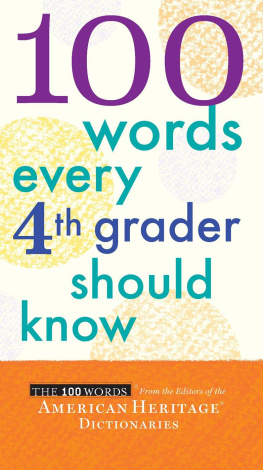

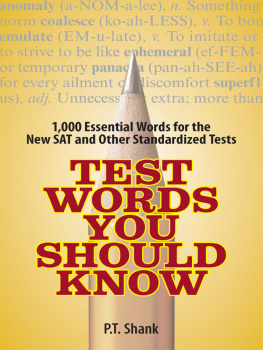
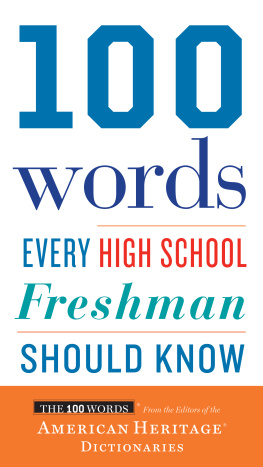
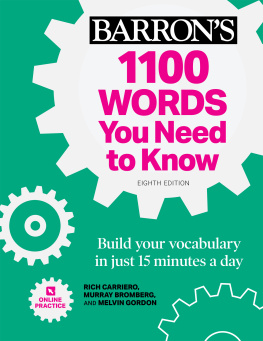

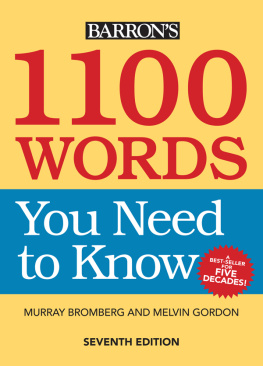
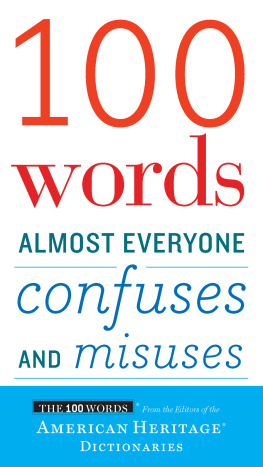
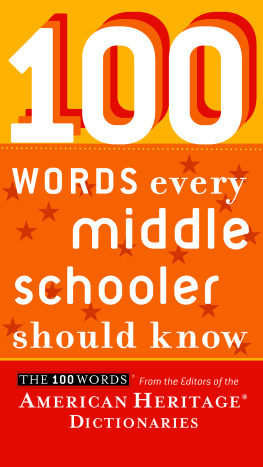

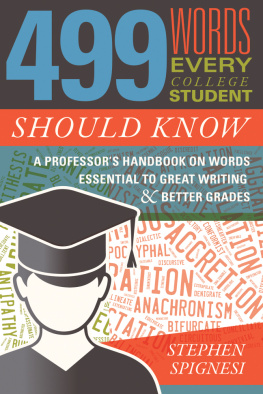
 is a registered trademark of Houghton Mifflin Harcourt Publishing Company.
is a registered trademark of Houghton Mifflin Harcourt Publishing Company.